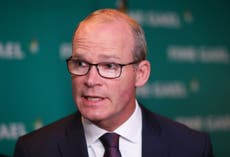EU officials tell me Brexit is far from ‘oven ready’ – but it could be if we extend the transition period
If we want to ensure that voters’ jobs and businesses are protected, we have to rethink the next phase of our departure

The European Union (Withdrawal Agreement) Bill sailed through the House of Commons last week and is likely to do more or less the same in the House of Lords this week.
The smooth passing of the bill is indicative of the transfer of power back from the legislature to the executive in this new era. An amendment that would have protected the right for unaccompanied child refugees to be reunited with their family after Brexit was even bulldozed over with the government’s sizeable majority.
There are signs ministers may concede on refugees in the Lords but the bill overall shows that the days of the collective opposition to the government asserting itself over ministers in parliamentary votes are well and truly over.
Make no mistake: any obstacles thrown in Boris Johnson’s way will not be erected by this new parliament – they will come from the other side of the EU-UK negotiating table.
Whether we like it or not, Brexit is happening and we must all make the best of it. That means it is imperative – and in all our interests – that, in the forthcoming negotiations on the future trading relationship, the government secures the best and closest possible trading relationship with the EU for the sake of British jobs, businesses and our economy.
However, the negotiations are subject to the platform on which the Conservatives were elected. After Brexit day on 31 January, we are scheduled to start the so called transition period – where the UK is out of the EU, has no say in EU institutions but agrees to abide by its rules and continues to pay into the club until the end of this year.
During this period the future trading relationship is to be settled. The Tory manifesto was clear: “We will negotiate a trade agreement next year ... and we will not extend the implementation period beyond December 2020.” In fact, this is written into the bill and will become law when it completes its passage through parliament. So what are the consequences of this?
A deep and meaningful comprehensive trade deal – the optimum arrangement – covering the greatest number of industries and not only goods but most services, which make up the majority of the economy, is out of the question. Only a shallow, barebones agreement could be reached in this timeframe and even that is not certain.
This is why the Irish deputy prime minister, Simon Coveney (whom I’ve always found to be very reasonable in my dealings with him) told the BBC yesterday that the EU had “constantly warned [Mr Johnson’s] timeframe is ambitious, if not unrealistic”.
The prime minister dismisses concerns around this and asserts an “oven ready” comprehensive trade deal is ready to go. But, as one senior European Commission official, who has been close to the EU-UK negotiations since they started, put it to me: “there is not an oven-ready deal” and whatever deal does emerge “will not exactly be nourishing”. The more appetising comprehensive trade deal ministers have talked about would take years, not months, to deliver. This is, in part, because the whole reason the Conservatives want to leave the EU is to diverge from its rules and regulations which makes talks somewhat more protracted. The official I spoke to was clear: “[The UK government] wants to diverge and that is not quick to negotiate – they are swimming against not with the tide.”
A more comprehensive “mixed” trade deal would also have to be ratified by national and regional parliaments across the EU, which cannot be achieved by the end of this year. Only a simpler trade agreement, requiring consent at EU level alone could hope to get through before 2021.
A barebones agreement, covering the basics such as goods exports could be nailed down by the end of the year. However, when I put this to an ambassador of one of the larger EU member states before Christmas he said there had been a lot of “illusory assumptions” around what is possible.
The EU has said the quid pro quo for a barebones deal would be a level playing field on workers, consumer and environmental protections and certain other issues, which it is hard to see the Johnson government agreeing to or the EU relenting on – Ursula von der Leyen, the new European Commission president was pretty uncompromising on this in her visit to London last week.
David Henig, a former assistant director of the Department for International Trade set out in this excellent Twitter thread the minefield that awaits and gave this verdict on the preparedness on the UK side for what is to come: “Domestically, government and parliament are not yet set up coherently to manage all these negotiations, devolved involvement is unknown, and businesses have to prepare both for no trade deal and to lobby for their interests in a deal.” It is hard to disagree with his analysis.
By way of illustration of what is at stake, consider the situation of the financial services sector. Often wrongly stereotyped as being made up of over-remunerated investment bankers on multimillion pound bonuses, this is a sector that is vital to our country and employs more than 1 million people, two-thirds of whom work outside of the City of London.
It accounts for 12 per cent of the economy and contributed more than £75bn in tax to the public coffers in the year to March 2019. One of the first items due to be sorted in the talks is the relationship between our financial regulatory regime and the EU’s. The starting point for that discussion is supposed to be that the EU recognises the UK’s supervisory regimes are broadly equivalent and trades with us on that basis – but agreement on this, if it is reached, could be withdrawn unilaterally by the EU with as little as 30 days’ notice, which does not exactly put financial services trade on a stable footing.
It is for this reason that it makes sense to shed the straight jacket and allow the transition period to be extended if necessary at the end of this year. Those who voted for the Tories last month will surely countenance breaking such a manifesto pledge if it helps safeguard their jobs and businesses – of course, the principal concern of many that Brexit goes ahead will already have happened well before 2021, so it won’t be a disaster if this occurs.
Chuka Umunna is a former Liberal Democrat MP



Join our commenting forum
Join thought-provoking conversations, follow other Independent readers and see their replies